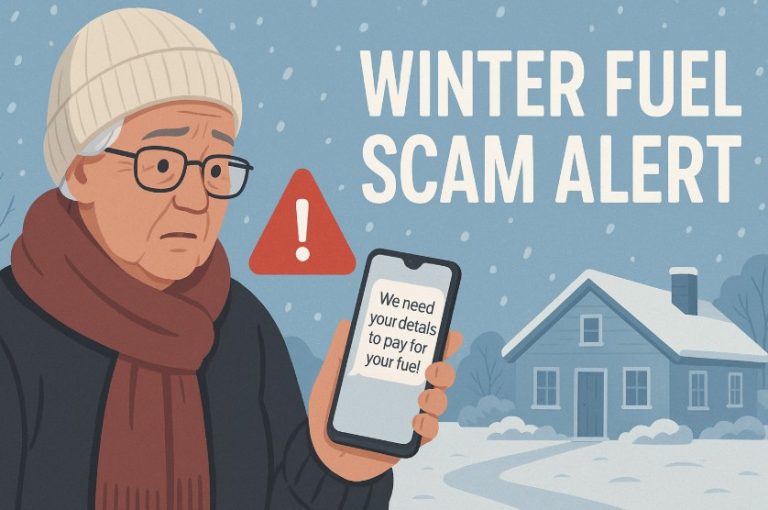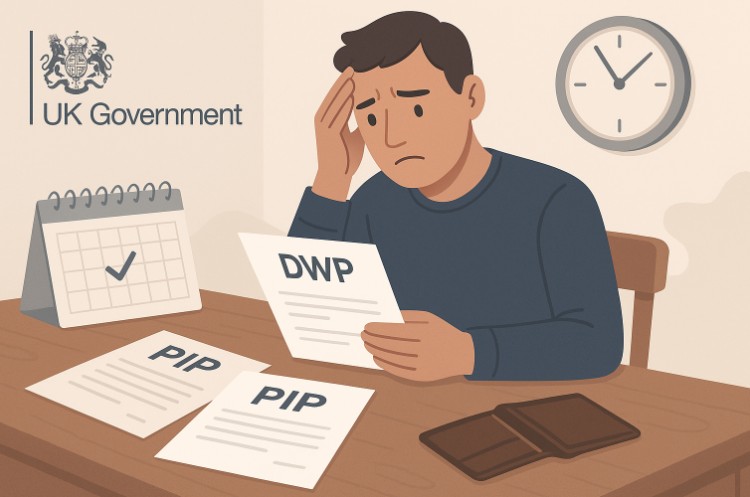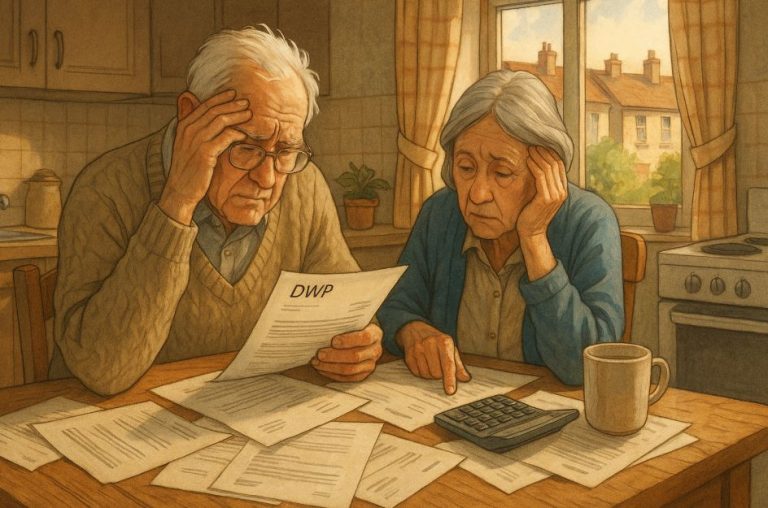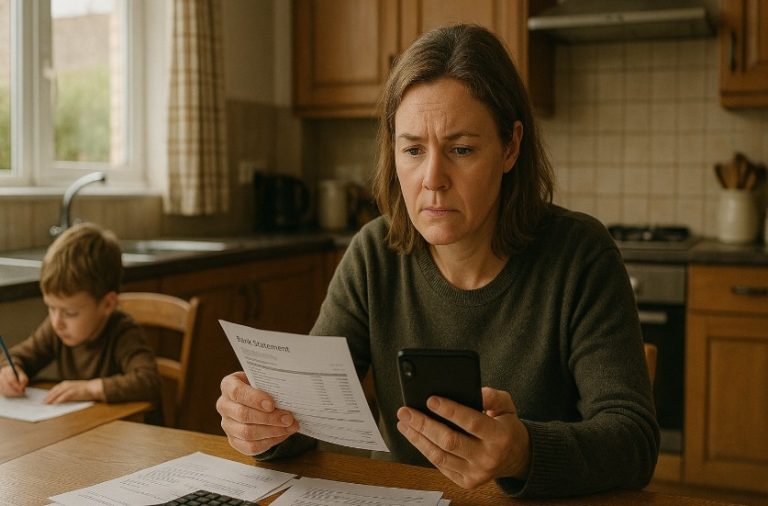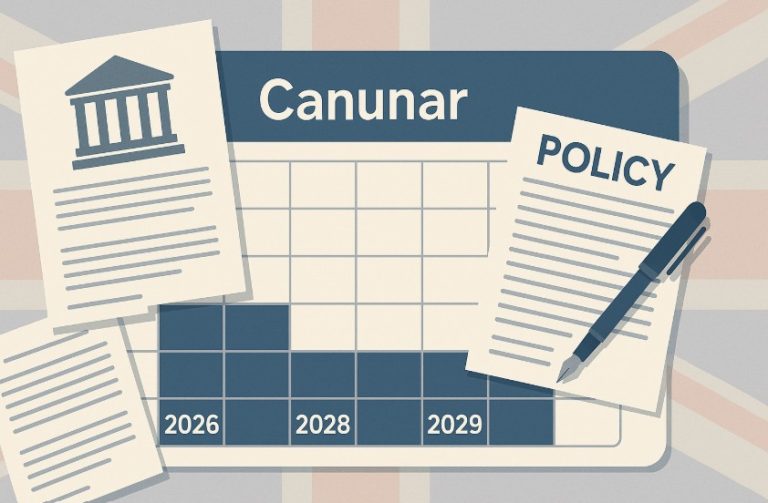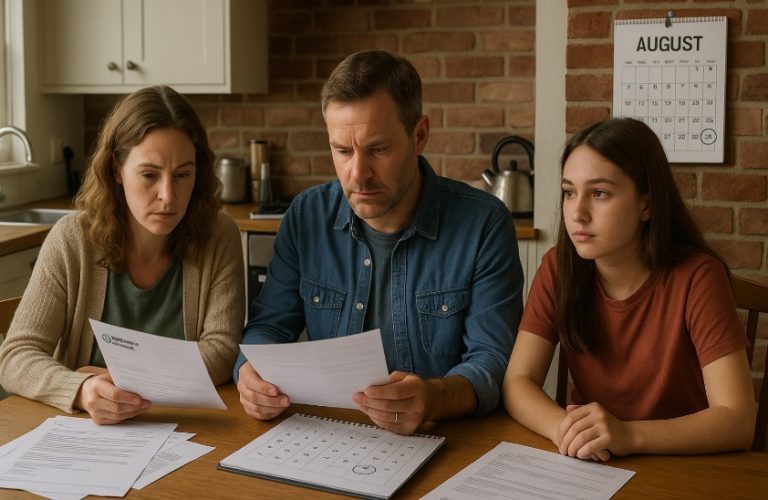When understanding how financial arrangements between separated parents impact government benefits, the relationship between child maintenance and Universal Credit often raises questions.
This blog explores whether child maintenance payments affect Universal Credit entitlement and provides a detailed look into how these two systems interact.
What Is Child Maintenance and Who Needs to Pay It?

Child maintenance is a financial contribution made by one parent to another to support the everyday costs of raising their child. It becomes necessary when parents live separately, regardless of whether they were ever in a formal relationship.
These payments ensure both parents continue to financially support their child, even if only one has day-to-day care.
The responsibility for contributing towards the child’s upbringing exists until the child turns 16 or up to 20 if they remain in approved education or training.
A child maintenance arrangement can be necessary in the following situations:
- Parents have separated or divorced
- One parent is not living with the child
- The parents were never in a relationship, but share parenting responsibilities
Who Is Eligible to Apply for Child Maintenance?
To use the Child Maintenance Service, the child must be under 16, or under 20 if in approved education or training, and normally live in the UK. Eligibility also depends on the applicant’s status and living arrangements.
| Eligible Applicants | Conditions |
| Parent | Living in the UK, may or may not live with the child |
| Grandparent/Guardian | Must have the main day-to-day care |
| Child (Scotland) | Must be over 12 |
| Ineligible Cases | Existing consent order under 1 year old, or both parties live abroad |
How to Apply for Child Maintenance?
Parents can arrange child maintenance privately or through the Child Maintenance Service (CMS). Use the Get help arranging child maintenance tool to explore options, apply, or set up a private agreement. If using CMS, key personal and financial details are required.
| Application Method | Key Details Needed |
| Private Arrangement | Agreement between both parents |
| CMS via Online Tool | Reference number, NI number, bank and income details |
| CMS via Phone | Used when online tool is unavailable |
| Variation Request | Apply if additional income/expenses should be considered |
How Can You Arrange Child Maintenance in the UK?
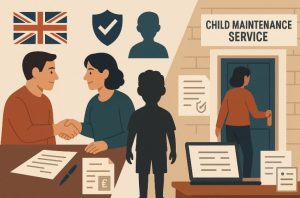
Child maintenance can be arranged through two primary methods depending on the nature of the parents’ relationship and ability to communicate effectively.
1. Private Arrangement
This involves a mutual agreement between both parents on how much should be paid and when. It offers flexibility and often avoids legal procedures. However, it depends heavily on trust and cooperation.
2. Child Maintenance Service (CMS)
When a private agreement cannot be reached, or where there is a history of domestic abuse or dispute, parents can involve CMS.
The service can:
- Calculate the appropriate amount of maintenance based on the paying parent’s income
- Manage and monitor payments to ensure consistency
- Enforce payments through legal action if needed
- Establish parentage if it’s questioned
- Protect privacy if one parent doesn’t want contact from the other
CMS charges a fee for their services unless specific conditions are met, such as eligibility for domestic abuse exemptions.
Does Child Maintenance Count as Income for Universal Credit?
Child maintenance received by a parent is not classified as income when calculating Universal Credit payments. The Department for Work and Pensions explicitly states that such payments are disregarded for the purposes of determining Universal Credit entitlement.
This means:
- The full amount of child maintenance received is excluded from Universal Credit calculations
- These payments do not reduce the amount of Universal Credit received
- Child maintenance remains non-taxable
The financial support from the other parent, therefore, does not interfere with government benefits and allows the receiving parent to retain both supports fully.
Will Receiving Child Maintenance Reduce My Universal Credit?
Parents who receive child maintenance can rest assured that their Universal Credit will remain unaffected. The purpose of Universal Credit is to provide means-tested support based on earnings and household circumstances, not on child maintenance contributions.
This rule applies to both:
- Voluntary/private agreements
- Payments made through the Child Maintenance Service
Here’s a table outlining how child maintenance interacts with different types of benefits:
| Benefit Type | Is Child Maintenance Counted as Income? | Affects Benefit Amount? |
| Universal Credit | No | No |
| Housing Benefit | No | No |
| Income Support | No | No |
| Child Tax Credit | No | No |
| Child Benefit | Not related | No |
Does Paying Child Maintenance Affect the Payer’s Universal Credit?
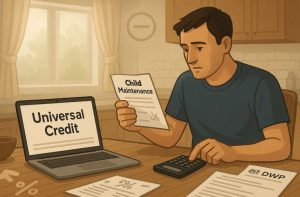
For the parent who pays maintenance, usually the non-resident parent, the payments are not deducted directly from their Universal Credit unless they fall into arrears.
In standard cases:
- The paying parent makes payments from their income
- These do not reduce or influence their Universal Credit entitlement
However, if the paying parent fails to keep up with their obligations, CMS can request deductions directly from the payer’s Universal Credit through third-party deductions. These are typically limited to a small percentage and prioritised below other debts such as rent or utilities.
Situations where deductions may apply:
- Accumulated child maintenance arrears
- Enforcement action taken by CMS
- Failure to agree to a payment schedule
How Does Universal Credit Support Parents and Children?
Universal Credit supports families by offering a single monthly payment that includes standard allowances and additional elements for dependent children. This helps cover the cost of raising children and provides stability for families with lower incomes or irregular employment.
The child element of Universal Credit includes:
- A standard additional amount for the first and second child
- Limited support for third and subsequent children, unless exceptions apply
- Additional amounts for children with disabilities
Universal Credit also encourages work by allowing claimants to:
- Keep a portion of their earnings before benefits are reduced
- Receive childcare support covering up to 85% of eligible childcare costs
- Access job support and coaching through Jobcentre Plus
What Happens to Universal Credit When Your Child Turns 16 or 19?
Universal Credit offers financial support for dependent children, but this support is not indefinite. It changes based on your child’s age and their educational or training status. Understanding these changes can help you prepare for any adjustments in your benefits and avoid overpayments or disruptions.
When your child turns 16?
Universal Credit includes a child element for each qualifying dependent child. This typically continues until the end of August following the child’s 16th birthday. However, if your child remains in approved education or training, the child element can be extended.
Approved education or training includes:
- Full-time non-advanced education such as A-levels, BTECs, Scottish Highers
- Vocational training like NVQ level 3, provided it’s more than 12 hours a week
- Recognised training schemes, including apprenticeships or traineeships
To keep receiving the child element after their 16th birthday, you must notify Universal Credit that your child is still enrolled in eligible education or training. This ensures that the payments continue seamlessly until they meet the next age threshold.
When your child turns 19?
If your child is still in qualifying education or training, support can continue until the end of August following their 19th birthday. After that point, Universal Credit will no longer consider them as a dependent, and the child element will be removed from your payment calculation.
If your child continues in education or starts working full-time, they may be able to claim Universal Credit in their own right. However, this is subject to specific eligibility conditions, particularly if they are still living at home.
Changes you must report
Universal Credit requires claimants to report changes to a child’s education or training status. You should notify DWP immediately if:
- Your child leaves education or training early
- The type of course changes or the provider changes
- Your child begins an apprenticeship that counts as employment
- Your child’s enrolment status is incorrectly listed or needs updating
You can report these changes using your Universal Credit online journal under the section for “Children and other people who live with you.”
Failure to provide accurate information can result in overpayments, which may need to be repaid. It can also cause interruptions in your monthly payment if DWP needs to reassess your claim.
Summary Table:
| Situation | Does Universal Credit Child Element Continue? |
| Child under 16 | Yes |
| Child aged 16–19 in approved education | Yes |
| Child aged 16–19 not in education | No |
| Child turns 19 before end of course | Until end of August after 19th birthday |
| Child starts full-time work | No |
What Are the Work Expectations for Parents on Universal Credit?

When claiming Universal Credit, work-related responsibilities are tailored based on each claimant’s household circumstances. Parents are expected to take steps towards employment, but the extent of those responsibilities depends heavily on the age of their youngest child and personal factors like health, caring duties, and work history.
Expectations by age of youngest child
The table below outlines what is typically expected from a parent based on their youngest child’s age:
| Age of Youngest Child | Work-Related Expectations |
| Under 1 | No work activity required |
| Age 1 | Attend work-focused interviews with a work coach |
| Age 2 | Work preparation, including CV writing and planning |
| Age 3–12 | Up to 30 hours/week of job-seeking or related activity |
| Age 13+ | Up to 35 hours/week of work or job-seeking activity |
Examples of work-related activity
Once your child is aged three or older, you may be expected to carry out structured work-related tasks. These can include:
- Creating and maintaining a CV or job profile
- Searching and applying for suitable jobs regularly
- Attending skills-building or vocational training courses
- Registering with employment agencies
- Participating in interviews or job coaching appointments
- Taking part in workshops to improve employability
These expectations are discussed and agreed upon in your Claimant Commitment, which is a formal agreement between you and your work coach. It outlines the types and number of activities you need to complete weekly or monthly.
Reductions and exemptions
In certain circumstances, parents may have reduced expectations or temporary exemptions from work-related activity. These apply to:
- Single parents with children under 3
- Foster carers (main carers in fostering couples or lone foster carers)
- Kinship carers or “family and friends” carers (for up to 12 months from the child’s placement)
- Parents of children with disabilities or special educational needs
- Parents without access to affordable or suitable childcare
- Claimants with health conditions or disabilities
Temporary exemptions may also be granted in cases such as:
- Bereavement of a child, partner, or family member (up to 6 months)
- Time-limited lack of childcare support
- Sudden personal crises affecting the claimant’s ability to engage in work activities
How expectations are monitored?
Your work coach monitors your progress through regular check-ins. You are required to show evidence of the work-related activities you’ve completed, such as:
- Screenshots of job applications
- Notes from training sessions
- Attendance confirmations from career workshops
If you do not meet your agreed expectations without good reason, sanctions can be applied. These may result in reduced payments until you re-engage with your responsibilities.
Supporting flexible work
Universal Credit is structured to support parents looking for flexible employment. The benefit is not based on the number of hours worked but rather on earnings. This means:
- You can take part-time or temporary jobs without losing full benefit entitlement
- Universal Credit will top up low income through a taper rate system
- You can build work experience while still receiving financial support
This approach aims to help parents gradually re-enter the workforce without immediate financial pressure, especially when transitioning from full-time caregiving to employment.
How Does Universal Credit Work with Child Benefit and Other Schemes?
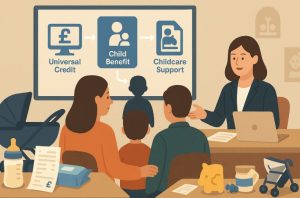
Child Benefit is completely separate from Universal Credit and continues to be paid regardless of whether the claimant is receiving other forms of support.
Additionally, families can access support for childcare costs in one of two ways:
- Universal Credit Childcare Element: Offers up to 85% reimbursement for eligible childcare
- Tax-Free Childcare Scheme: Provides a 20% top-up on childcare costs via a separate government account
You cannot claim both schemes simultaneously. Choosing the correct scheme depends on your working hours, childcare expenses, and overall income. Universal Credit generally provides higher support for low-income working families, especially those with several children.
What Should You Report to Universal Credit If Your Circumstances Change?
Although child maintenance payments do not affect your Universal Credit, certain related changes should still be reported:
- Your child leaves or changes school or training
- You stop caring for a child who previously lived with you
- Your household composition changes
- Your childcare arrangements or costs are updated
- A new child joins your household or you stop fostering
Updates should be reported as soon as possible using the Universal Credit online account. Keeping your records accurate helps avoid overpayments or delays.
Conclusion
In summary, child maintenance payments do not affect Universal Credit entitlement, whether you are receiving or paying them. This is a deliberate policy to ensure children benefit fully from parental contributions without penalising low-income families.
Universal Credit is designed to be flexible, supportive, and tailored to each family’s needs. To maximise support and avoid any disruption to your benefits, ensure you report any relevant changes in your child’s status, education, or maintenance arrangements.
Frequently Asked Questions
Can Universal Credit take money for unpaid child maintenance?
Yes, the Child Maintenance Service can request deductions from Universal Credit to recover arrears if the paying parent fails to meet their obligations.
Is child maintenance considered taxable income?
No, child maintenance is not taxable. It is exempt from both income tax and National Insurance.
Will my partner’s child maintenance affect our joint Universal Credit claim?
No. Child maintenance payments made to or by a partner in a joint claim do not count as income and won’t affect the overall entitlement.
Does CMS notify Universal Credit of my payments?
No, CMS and Universal Credit are separate systems. Any relevant changes in circumstances should be reported by the claimant themselves.
Can I claim child maintenance and Universal Credit at the same time?
Yes, you can receive both without one affecting the other.
How often should I update Universal Credit if child maintenance changes?
You only need to update your Universal Credit if the maintenance arrangement affects other household circumstances (e.g. a child moves out), as the payments themselves are not counted.
Will my Universal Credit increase if I stop receiving child maintenance?
No. Since child maintenance is not counted as income, stopping it does not increase your Universal Credit amount.

